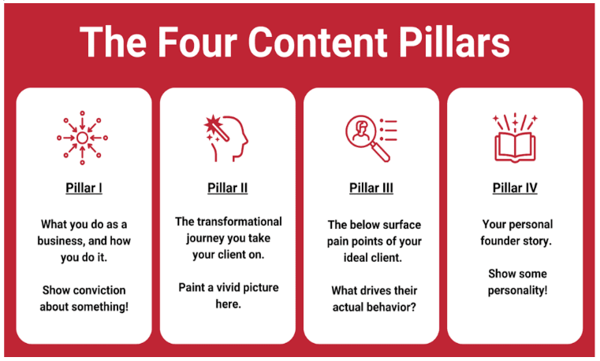Our view at Stack - Simplify growth with an all-in-one platform. Powerful marketing, sales, and support automation. Integrated CMS. Scalable software. Crafted for customer experience.
Kris Hughes is a content strategy and storytelling wizard. He:
✍️ Wrote (and sold) blogs before it was cool
👻 Spent years ghostwriting daily social content for clients, from agencies to CEOs
🖥️ Runs his own digital strategy consulting firm (on track to hit 30% YoY revenue growth)
Here are Kris’ six tips for nailing your content strategy — to generate solid, authentic leads.
1. If You Don’t Tell Your Brand’s Story, Someone Else Will
As a founder with a million priorities, content like blogs and social media posts can seem like low-priority items.
But if you don’t tell your brand’s story, someone else will make assumptions and tell it for you.
Don’t sit on your hands when it comes to content. Your story and voice need to:
- Be authentic
- Feel natural to you
- Make sense to your target audience
Hot tip: Take a look at your competitors — if they’re not doing a strong enough job of telling their story, they’re leaving content gaps on the table for you to capitalize on.
2. Do a Thorough Brain Dump
Spend ~30 days on a “brain dump” exercise, using voice notes and free-form writing. Record every thought you have on your brand, then pass it on to someone who is close to, but not a part of, your business.
Ask them what they see from the outside looking in. What words are used over and over again? What topics keep returning? This deep-dive step is vital for two reasons.
One: “People are their own worst marketers,” Kris says. “There’s probably a ton about your own brand story you’re not telling. The deep dive and outside perspective brings this to the surface.”
Second, this exercise will spin off aligned talking points so that you can hit the ground running with a clear strategy and bank of great content — in your own words.
3. Extrapolate Four Key Pillars for Your Content
Sift through your brain dump and organize each idea, spicy quote, or topic, into one of four pillars:
 Source: Kris Hughes / Zanate Ventures
Source: Kris Hughes / Zanate Ventures
Each pillar gives rise to specific types of content, and alternating between them will ensure the topics you speak about remain varied and fresh, but also on brand.
For example, one week you may talk about the results you’ve driven for a client (Pillar II), and the next share some of your founder story (Pillar IV).
And if you ever get writer’s block, you can return to your pillars as inspiration and a reminder of what you want to convey to your audience.
4. Focus on Community-Building before You Put Out Content
Create a community from the get-go by interacting with your ideal clients, competitors, and peers through value-driven comments and messages.
This step gets you comfortable with how you write, how you portray yourself, and how people receive you.
Keeping track of comments you make (e.g., in Notion) will also ensure you have a content ideas bank; most valuable comments can usually be bulked up into a post.
5. Now You Can Get Your Content Out There
Use your pillars, saved comments, and brain dump to generate content that is authentic to your brand. Remember to:
📈 Have a clear KPI: Is your content to build generalized awareness, or drive leads?
📝 Develop a voice guide, a resource guide, and a content calendar.
Kris is an advocate of scheduling content to make sure you get it out there. While the cadence and approach of posting will depend on the platform, consistency is always key.
6. Remember: Content Is A Long Game.
It takes time to build up a reputation to the point where your content drives leads. Keep at it.
“Many founders come in guns blazing with high energy, and then fizzle out after a few months,” says Kris. You’ll miss the magic if you do. Stay motivated by:
- Setting new benchmarks
- Focusing on positive feedback
- Reusing your top-performing posts every few months
As a final tip, Kris suggests talking to your customers when things are going well.
 Source: Tenor
Source: Tenor
“We tend to reach out only when we need to put out fires,” he told us. “But getting client feedback during the good times means you’ll find room for incremental improvement — when you have the capacity to act on it.”
Positive customer transformation journeys are powerful additions to your brand story.
![]()
If Hubspot is of interest and you'd like more information, please do make contact or take a look in more detail here.
Credit: Original article published here.
